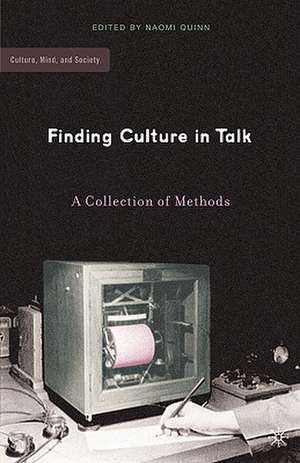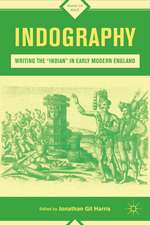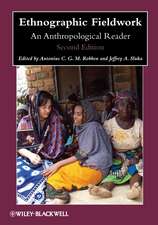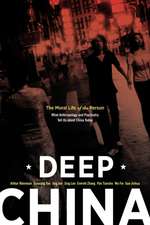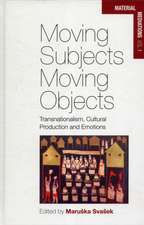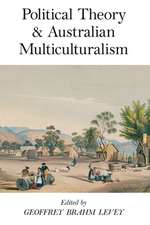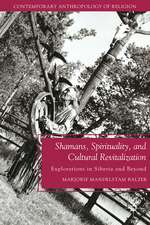Finding Culture in Talk: A Collection of Methods: Culture, Mind, and Society
Editat de N. Quinnen Limba Engleză Paperback – 31 oct 2005
| Toate formatele și edițiile | Preț | Express |
|---|---|---|
| Paperback (1) | 385.25 lei 6-8 săpt. | |
| Palgrave Macmillan US – 31 oct 2005 | 385.25 lei 6-8 săpt. | |
| Hardback (1) | 392.37 lei 6-8 săpt. | |
| Palgrave Macmillan US – 31 oct 2005 | 392.37 lei 6-8 săpt. |
Din seria Culture, Mind, and Society
- 15%
 Preț: 695.01 lei
Preț: 695.01 lei - 15%
 Preț: 702.05 lei
Preț: 702.05 lei -
 Preț: 383.71 lei
Preț: 383.71 lei - 15%
 Preț: 706.63 lei
Preț: 706.63 lei -
 Preț: 381.98 lei
Preț: 381.98 lei - 15%
 Preț: 586.05 lei
Preț: 586.05 lei -
 Preț: 387.20 lei
Preț: 387.20 lei -
 Preț: 386.81 lei
Preț: 386.81 lei -
 Preț: 388.72 lei
Preț: 388.72 lei - 15%
 Preț: 495.68 lei
Preț: 495.68 lei - 18%
 Preț: 895.58 lei
Preț: 895.58 lei -
 Preț: 392.97 lei
Preț: 392.97 lei - 15%
 Preț: 635.31 lei
Preț: 635.31 lei - 18%
 Preț: 731.91 lei
Preț: 731.91 lei - 15%
 Preț: 639.25 lei
Preț: 639.25 lei -
 Preț: 386.00 lei
Preț: 386.00 lei -
 Preț: 391.61 lei
Preț: 391.61 lei -
 Preț: 382.75 lei
Preț: 382.75 lei - 15%
 Preț: 591.47 lei
Preț: 591.47 lei -
 Preț: 386.99 lei
Preț: 386.99 lei - 18%
 Preț: 948.61 lei
Preț: 948.61 lei - 18%
 Preț: 948.79 lei
Preț: 948.79 lei - 15%
 Preț: 699.59 lei
Preț: 699.59 lei -
 Preț: 387.38 lei
Preț: 387.38 lei -
 Preț: 199.76 lei
Preț: 199.76 lei -
 Preț: 385.84 lei
Preț: 385.84 lei - 15%
 Preț: 582.95 lei
Preț: 582.95 lei -
 Preț: 389.31 lei
Preț: 389.31 lei -
 Preț: 390.46 lei
Preț: 390.46 lei
Preț: 385.25 lei
Nou
Puncte Express: 578
Preț estimativ în valută:
73.71€ • 76.97$ • 60.87£
73.71€ • 76.97$ • 60.87£
Carte tipărită la comandă
Livrare economică 15-29 aprilie
Preluare comenzi: 021 569.72.76
Specificații
ISBN-13: 9781403969156
ISBN-10: 1403969159
Pagini: 275
Ilustrații: X, 277 p.
Dimensiuni: 152 x 229 x 16 mm
Greutate: 0.35 kg
Ediția:2005
Editura: Palgrave Macmillan US
Colecția Palgrave Macmillan
Seria Culture, Mind, and Society
Locul publicării:New York, United States
ISBN-10: 1403969159
Pagini: 275
Ilustrații: X, 277 p.
Dimensiuni: 152 x 229 x 16 mm
Greutate: 0.35 kg
Ediția:2005
Editura: Palgrave Macmillan US
Colecția Palgrave Macmillan
Seria Culture, Mind, and Society
Locul publicării:New York, United States
Cuprins
Introduction; N.Quinn How to Reconstruct Schemas People Share, from What They Say; N.Quinn Some Methods for Studying Cultural Cognitive Structures; R.D'Andrade Uncovering Cultural Models of Gender from Accounts of Folktales; H.Mathews Finding Culture in Narrative; J.H.Hill Analyzing Discourse for Cultural Complexity; C.Strauss 'Good Enough' Methods for Life Story Analysis; W.Luttrell
Recenzii
"One of the best features of the book is the emphasis the contributors give to ruminating about the strengths and weaknesses of interviewing as a research method and analytical process. Another is the attention paid by various authors to the inconsistencies of both research and human lives. Even though this is very much a how to book, there is nothing mechanistic about these approaches to research and I appreciate how the authors show us ways to combine the creativity of the researcher with systematic approaches to information gathering in order to produce better results." - Wayne Fife, Memorial University of Newfoundland, Canada
'Finding Culture in Talk is a wonderful antidote to the 'science wars'. Its diverse offerings of methodological creativity all share an understanding of culture that takes into account how the human mind works and provide examples of how anthropologists can explicate but not reduce the richness and complexity of cultural meanings. This book is an invaluable tool for students and practiced anthropologists alike.' Victoria K. Burbank, University of Western Australia
"Finding Culture in Talk is a wonderful antidote to the 'science wars'. Its diverse offerings of methodological creativity all share an understanding of culture that takes into account how the human mind works and provide examples of how anthropologists can explicate but not reduce the richness and complexity of cultural meanings. This book is an invaluable tool for students and practiced anthropologists alike." - Victoria Burbank, University of West Alabama
"An excellent place to learn from experienced researchers about 'how to' approach the cultural analysis of discourse. Theoretically motivated, methodologically attentive, and pragmatically oriented, the valuable introductory chapter by Quinn sets the stage. The individual chapters that follow are full of insights and rich in detailed examples linking findings with the research process, as contributors reflect on their strategies for discovering the cultural meanings that underpin what is said in interviews and other forms of talk." - Linda Garro, University of California, Los Angeles
'Finding Culture in Talk is a wonderful antidote to the 'science wars'. Its diverse offerings of methodological creativity all share an understanding of culture that takes into account how the human mind works and provide examples of how anthropologists can explicate but not reduce the richness and complexity of cultural meanings. This book is an invaluable tool for students and practiced anthropologists alike.' Victoria K. Burbank, University of Western Australia
"Finding Culture in Talk is a wonderful antidote to the 'science wars'. Its diverse offerings of methodological creativity all share an understanding of culture that takes into account how the human mind works and provide examples of how anthropologists can explicate but not reduce the richness and complexity of cultural meanings. This book is an invaluable tool for students and practiced anthropologists alike." - Victoria Burbank, University of West Alabama
"An excellent place to learn from experienced researchers about 'how to' approach the cultural analysis of discourse. Theoretically motivated, methodologically attentive, and pragmatically oriented, the valuable introductory chapter by Quinn sets the stage. The individual chapters that follow are full of insights and rich in detailed examples linking findings with the research process, as contributors reflect on their strategies for discovering the cultural meanings that underpin what is said in interviews and other forms of talk." - Linda Garro, University of California, Los Angeles
Notă biografică
Naomi Quinn is Professor Emerita of the Cultural Anthropology Department at Duke University, USA. Among her publications, she is co-author of A Cognitive Theory of Cultural Meaning (1997) and editor of Finding Culture in Talk (2005). She is a past president of the Society for Psychological Anthropology and was awarded that society's 2009 Lifetime Achievement Award.
